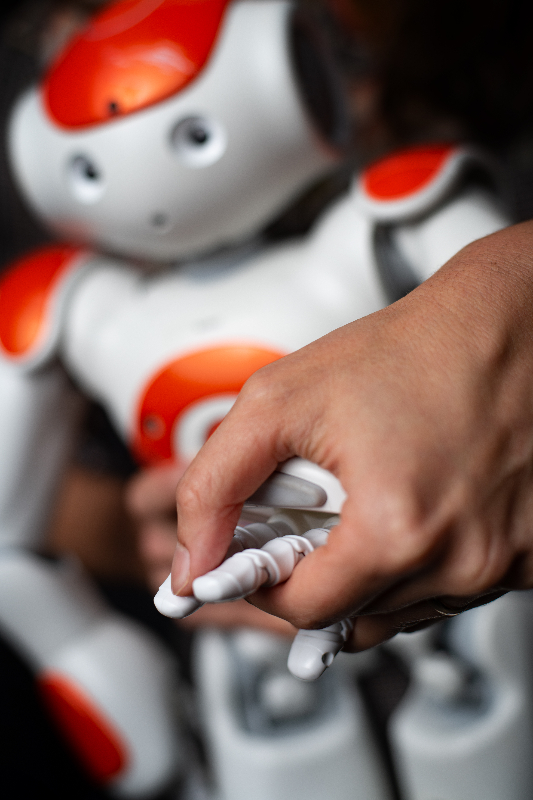- Introduction to the field: types of interaction, anthropomorphism and embodying, design principles of social robotics.
- Building of social robots: generic system design, software components and systems.
- The robot perception of the user: different modalities and sensor fusion.
- Verbal and non-verbal communication: dialogue, movement and animation.
- Social reasoning and decision making.
- Experiment design how to design and carry out HRI-experiments, common measurements for HRI, annotation of data and behavioural analysis.
- Social learning.
- Cooperation between humans and robots.
- Application areas: remote-controlled robots from control to semi-autonomous, social assistent robots for education and healthcare.
- Social and ethical considerations of use in social environments.
DD2413 Social Robotics 7.5 credits

This course provides an overview of the-state-of-the-art algorithms, computational techniques and paradigms used to build robots that interact with people.
Information per course offering
Information for Autumn 2025 Start 27 Oct 2025 programme students
- Course location
KTH Campus
- Duration
- 27 Oct 2025 - 12 Jan 2026
- Periods
Autumn 2025: P2 (7.5 hp)
- Pace of study
50%
- Application code
50348
- Form of study
Normal Daytime
- Language of instruction
English
- Course memo
- Course memo is not published
- Number of places
Places are not limited
- Target group
- Students admitted to a master's programme, as long as it can be included in your programme.
- Planned modular schedule
- [object Object]
- Schedule
- Part of programme
- No information inserted
Contact
Course syllabus as PDF
Please note: all information from the Course syllabus is available on this page in an accessible format.
Course syllabus DD2413 (Autumn 2022–)Content and learning outcomes
Course contents
Intended learning outcomes
On completion of the course, students should be able to
- apply different concepts within social robotics
- choose and justify efficient calculation methods for the ability of social robots to perceive, make decisions and move
- use suitable software design and tools to develop applications for social robotics
- design, analyse and document experiments in human-robot-interaction (HRI)
- demonstrate understanding of the social and ethical aspects of the design, the development and the use of social robots.
Literature and preparations
Specific prerequisites
Knowledge in foundations of computer science, 6 credits, equivalent to completed course DD1338/DD1320-DD1327/DD2325/ID1020/ID1021.
Literature
Examination and completion
Grading scale
Examination
- LABA - Laboratory work, 1.5 credits, grading scale: A, B, C, D, E, FX, F
- LABB - Laboratory work, 1.5 credits, grading scale: A, B, C, D, E, FX, F
- PROA - Project work, 4.5 credits, grading scale: A, B, C, D, E, FX, F
Based on recommendation from KTH’s coordinator for disabilities, the examiner will decide how to adapt an examination for students with documented disability.
The examiner may apply another examination format when re-examining individual students.
If the course is discontinued, students may request to be examined during the following two academic years.
Examiner
Ethical approach
- All members of a group are responsible for the group's work.
- In any assessment, every student shall honestly disclose any help received and sources used.
- In an oral assessment, every student shall be able to present and answer questions about the entire assignment and solution.
Further information
Course room in Canvas
Offered by
Main field of study
Education cycle
Supplementary information
In this course, the EECS code of honor applies, see:
http://www.kth.se/en/eecs/utbildning/hederskodex.